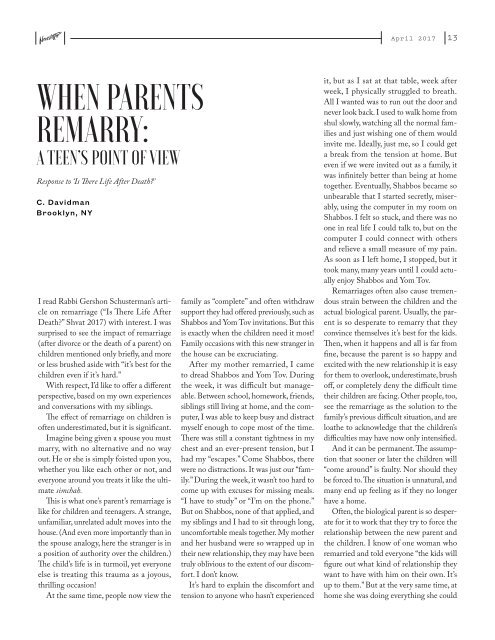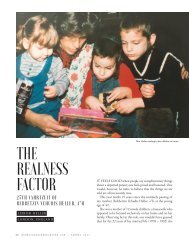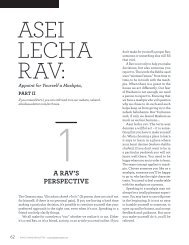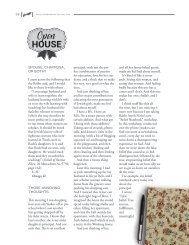Teens Perspective Remarriage
You also want an ePaper? Increase the reach of your titles
YUMPU automatically turns print PDFs into web optimized ePapers that Google loves.
April 2017<br />
13<br />
WHEN PARENTS<br />
REMARRY:<br />
A TEEN’S POINT OF VIEW<br />
Response to ‘Is There Life After Death?’<br />
C. Davidman<br />
Brooklyn, NY<br />
I read Rabbi Gershon Schusterman’s article<br />
on remarriage (“Is There Life After<br />
Death?” Shvat 2017) with interest. I was<br />
surprised to see the impact of remarriage<br />
(after divorce or the death of a parent) on<br />
children mentioned only briefly, and more<br />
or less brushed aside with “it’s best for the<br />
children even if it’s hard.”<br />
With respect, I’d like to offer a different<br />
perspective, based on my own experiences<br />
and conversations with my siblings.<br />
The effect of remarriage on children is<br />
often underestimated, but it is significant.<br />
Imagine being given a spouse you must<br />
marry, with no alternative and no way<br />
out. He or she is simply foisted upon you,<br />
whether you like each other or not, and<br />
everyone around you treats it like the ultimate<br />
simchah.<br />
This is what one’s parent’s remarriage is<br />
like for children and teenagers. A strange,<br />
unfamiliar, unrelated adult moves into the<br />
house. (And even more importantly than in<br />
the spouse analogy, here the stranger is in<br />
a position of authority over the children.)<br />
The child’s life is in turmoil, yet everyone<br />
else is treating this trauma as a joyous,<br />
thrilling occasion!<br />
At the same time, people now view the<br />
family as “complete” and often withdraw<br />
support they had offered previously, such as<br />
Shabbos and Yom Tov invitations. But this<br />
is exactly when the children need it most!<br />
Family occasions with this new stranger in<br />
the house can be excruciating.<br />
After my mother remarried, I came<br />
to dread Shabbos and Yom Tov. During<br />
the week, it was difficult but manageable.<br />
Between school, homework, friends,<br />
siblings still living at home, and the computer,<br />
I was able to keep busy and distract<br />
myself enough to cope most of the time.<br />
There was still a constant tightness in my<br />
chest and an ever-present tension, but I<br />
had my “escapes.” Come Shabbos, there<br />
were no distractions. It was just our “family.”<br />
During the week, it wasn’t too hard to<br />
come up with excuses for missing meals.<br />
“I have to study” or “I’m on the phone.”<br />
But on Shabbos, none of that applied, and<br />
my siblings and I had to sit through long,<br />
uncomfortable meals together. My mother<br />
and her husband were so wrapped up in<br />
their new relationship, they may have been<br />
truly oblivious to the extent of our discomfort.<br />
I don’t know.<br />
It’s hard to explain the discomfort and<br />
tension to anyone who hasn’t experienced<br />
it, but as I sat at that table, week after<br />
week, I physically struggled to breath.<br />
All I wanted was to run out the door and<br />
never look back. I used to walk home from<br />
shul slowly, watching all the normal families<br />
and just wishing one of them would<br />
invite me. Ideally, just me, so I could get<br />
a break from the tension at home. But<br />
even if we were invited out as a family, it<br />
was infinitely better than being at home<br />
together. Eventually, Shabbos became so<br />
unbearable that I started secretly, miserably,<br />
using the computer in my room on<br />
Shabbos. I felt so stuck, and there was no<br />
one in real life I could talk to, but on the<br />
computer I could connect with others<br />
and relieve a small measure of my pain.<br />
As soon as I left home, I stopped, but it<br />
took many, many years until I could actually<br />
enjoy Shabbos and Yom Tov.<br />
<strong>Remarriage</strong>s often also cause tremendous<br />
strain between the children and the<br />
actual biological parent. Usually, the parent<br />
is so desperate to remarry that they<br />
convince themselves it’s best for the kids.<br />
Then, when it happens and all is far from<br />
fine, because the parent is so happy and<br />
excited with the new relationship it is easy<br />
for them to overlook, underestimate, brush<br />
off, or completely deny the difficult time<br />
their children are facing. Other people, too,<br />
see the remarriage as the solution to the<br />
family’s previous difficult situation, and are<br />
loathe to acknowledge that the children’s<br />
difficulties may have now only intensified.<br />
And it can be permanent. The assumption<br />
that sooner or later the children will<br />
“come around” is faulty. Nor should they<br />
be forced to. The situation is unnatural, and<br />
many end up feeling as if they no longer<br />
have a home.<br />
Often, the biological parent is so desperate<br />
for it to work that they try to force the<br />
relationship between the new parent and<br />
the children. I know of one woman who<br />
remarried and told everyone “the kids will<br />
figure out what kind of relationship they<br />
want to have with him on their own. It’s<br />
up to them.” But at the very same time, at<br />
home she was doing everything she could
14 nsheichabadnewsletter.com<br />
to force them to spend time together,<br />
which of course backfired. For example,<br />
she would promise to take a child somewhere<br />
special, and as they were on their<br />
way out the door, she would switch with<br />
her husband and tell the child, “Oh, he’s<br />
going to take you instead,” giving the child<br />
no way to back out.<br />
The same way forced friendships never<br />
work, this is a sure recipe for disaster. In<br />
that family, by trying to force the relationship<br />
between her new husband and her<br />
children, the only thing the mother accomplished<br />
was alienating her children. None<br />
of them developed a lasting relationship<br />
with him, their relationship with her took<br />
a turn for the worse, all left home as soon<br />
as possible, and they rarely visit.<br />
In frum life, because of the laws of<br />
yichud and negia, some of these issues are<br />
magnified. Consider the teenager who<br />
can no longer leave her bedroom unless<br />
she is 100% tzniusdik because there is an<br />
unrelated adult male living in the house.<br />
She can no longer sing Haneiros Halalu at<br />
Chanukah or join in the Shabbos zemiros.<br />
Alternatively, perhaps the mother is pushing<br />
for normalcy and urging the daughter<br />
to sing along which goes against everything<br />
that has been ingrained in her over the<br />
years. Imagine the teenage boy who comes<br />
home, finds his new stepmother alone at<br />
home, and has to either leave or open a<br />
door, and imagine the stepmother doesn’t<br />
appreciate having a door opened, so he<br />
stops doing it, and soon just stops coming<br />
home during lunch break altogether, even<br />
though no lunch is served at his school.<br />
These are examples of some of the small<br />
issues which compound the greater issues,<br />
and make the children feel like strangers<br />
in their own home.<br />
When the step-parent is of the same<br />
gender, there are other challenges. The boys<br />
are expected to sit with him in shul. The<br />
girls are expected to invite her to school<br />
events and go clothes-shopping with her.<br />
Moreover, our culture of dating so<br />
secretively has its downside. Of course,<br />
dating parents should not introduce their<br />
children to every person they meet. But<br />
the same way one should take dating longer<br />
and slower the second time around,<br />
surely meeting the children and feeling out<br />
how those relationships might work should<br />
be part of the pre-engagement stage in a<br />
remarriage. When the children are unaware<br />
the parent is dating at all, only to have the<br />
news sprung on them that the parent is<br />
now engaged to someone they’ve never<br />
met, you’re already starting out ten steps<br />
behind.<br />
I know of a number of cases in which<br />
children received phone calls from their parents<br />
during sleep-away camp announcing<br />
their engagement to someone the children<br />
had never met. Understandably, when the<br />
children are away the parents find themselves<br />
with more available time to invest<br />
in dating. The excitement can be overwhelming<br />
and the desire to formalize and<br />
announce it may be hard to contain. But<br />
think about the children! Is it fair to them?<br />
Picture your child, immersed in the camp<br />
experience, being called away from lunch<br />
to take an unexpected phone call from<br />
home. By the time he returns to the table,<br />
where the cheering and singing continues<br />
unabated, his life has completely changed!<br />
An entirely new and different reality awaits<br />
him when camp ends and he returns home,<br />
and he had no warning and absolutely no<br />
idea what to expect. Would you do that to<br />
another adult? Why to a child?<br />
While there is a small window to<br />
remarry with less risk of causing ongoing<br />
pain and discomfort<br />
to the<br />
children when<br />
the children<br />
are very, very<br />
young, once the<br />
children are preteens<br />
and older,<br />
it is very difficult<br />
if not impossible<br />
to avoid.<br />
Moreover, many<br />
parents are sure<br />
they have such a<br />
strong relationship with their children that<br />
they know how their children feel about<br />
their remarriage. Unfortunately, that is very<br />
often not the case.<br />
It is also imperative to consider the way<br />
this marriage will color the children’s perception<br />
of marriage and affect their future<br />
relationships. While living in a single-parent<br />
home comes with its own challenges,<br />
and does not provide the children a model<br />
of marriage to emulate, which are serious<br />
problems, remarriage has its own set of<br />
negatives and repercussions, when the children<br />
are not very young or all grown up.<br />
For one young woman I know, her<br />
father’s remarriage marked the beginning<br />
of such a difficult period in her life that<br />
for many years thereafter she couldn’t tolerate<br />
going to weddings. Every wedding<br />
was a reminder of the wedding that had<br />
turned her life upside down. Just hearing<br />
the Alter Rebbe’s niggun made her entire<br />
body shake. She missed many friends’ weddings<br />
and when she was finally ready for<br />
her own, she created an entirely non-traditional<br />
wedding that reminded her in no<br />
way of her father’s.<br />
I would beg all single parents to remember<br />
that a parent’s first responsibility is<br />
towards the children that they already have.<br />
Children did not choose or ask to be born.<br />
If the best thing for them is to wait and<br />
marry again after they are grown and settled<br />
in their adult lives (and it often is),<br />
then I feel that is what the parent—who<br />
chose to have the children—should do. 5<br />
GITTY BRONSTEIN, LCSW<br />
Licensed Clinical Social Worker<br />
Adult, Adolescent<br />
& Child Psychotherapist<br />
917 446 5444<br />
gittybron@gmail.com


















